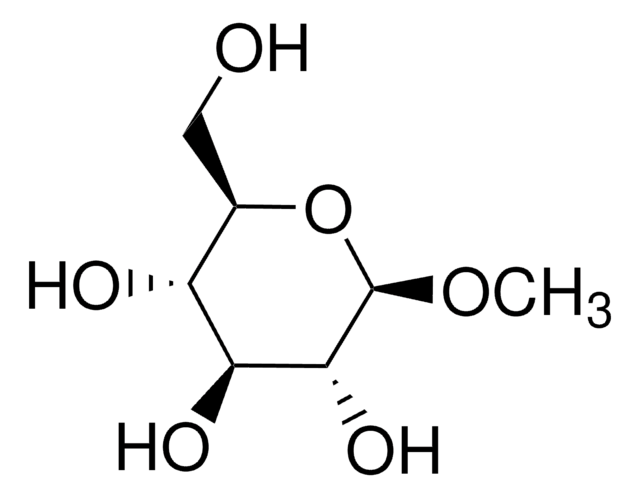67770
Methyl α-D-mannopyranoside
≥99.0%, suitable for microbiology, enables differentiation between species of Listeria
Synonym(s):
Methyl alpha-D-mannoside, Methyl-alpha-D-mannopyranoside, α-Methyl D-mannoside
About This Item
Recommended Products
Quality Level
Assay
≥99.0% (sum of enantiomers, HPLC)
≥99.0%
form
powder
optical activity
[α]20/D 77.0 to 82.0°, c = 10% in H2O
mol wt
194.18 g/mol
mp
187-195 °C
193-196 °C (lit.)
solubility
H2O: 0.1 g/mL, clear, colorless
application(s)
microbiology
SMILES string
CO[C@H]1O[C@H](CO)[C@@H](O)[C@H](O)[C@@H]1O
InChI
1S/C7H14O6/c1-12-7-6(11)5(10)4(9)3(2-8)13-7/h3-11H,2H2,1H3/t3-,4-,5+,6+,7+/m1/s1
InChI key
HOVAGTYPODGVJG-VEIUFWFVSA-N
Looking for similar products? Visit Product Comparison Guide
General description
Application
Other Notes
Storage Class Code
11 - Combustible Solids
WGK
WGK 3
Flash Point(F)
404.1 °F
Flash Point(C)
206.74 °C
Personal Protective Equipment
Choose from one of the most recent versions:
Already Own This Product?
Find documentation for the products that you have recently purchased in the Document Library.
Customers Also Viewed
Articles
Culture media provides a habitat with suitable nutrients, energy sources, and certain environmental conditions for the growth of microorganisms. The components of the culture media range from simple sugars to peptones, salts, antibiotics, and complex indicators.
Our team of scientists has experience in all areas of research including Life Science, Material Science, Chemical Synthesis, Chromatography, Analytical and many others.
Contact Technical Service















